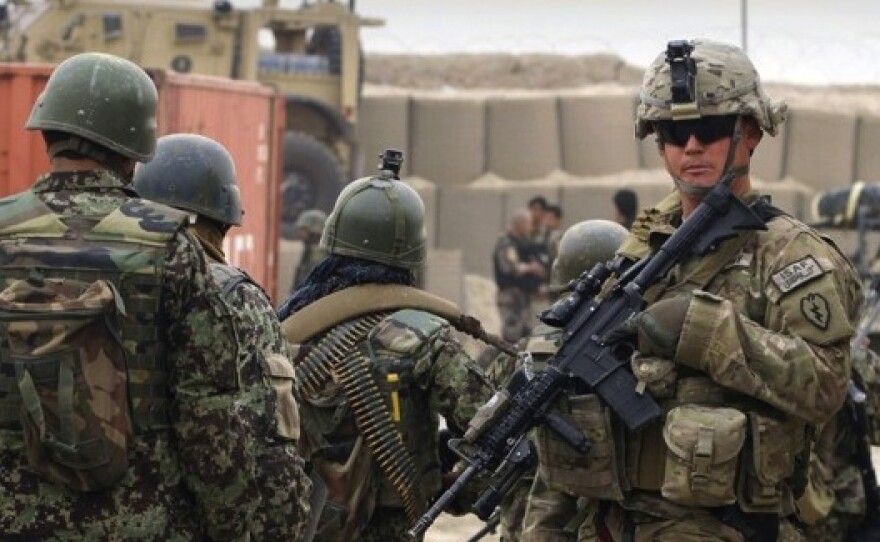The killings of some 16 civilians in Afghanistan on Sunday allegedly by a U.S. soldier are raising new questions about U.S. military strategy: whether the surge of American troops worked, and whether the U.S. troops have won over the Afghan people or alienated them.
The place where the killings happened was a "no-go zone" for American and even Afghan troops as recently as two years ago — it was Taliban country.
That changed when soldiers from the 101st Airborne Division swept into the rural district in the dead of night in November 2010. Back then, Capt. Davitt Broderick stood in his command post, a two-story adobe house in Panjwai, near Kandahar. He said that better security would lead to schools, clinics and fewer young men joining the Taliban.
"The couple of guys that were shooting at us, you know, they could be an active part of society next year," he said, "if things go right."
Things did go right in that district. The so-called surge of U.S. forces helped push out the Taliban there.
Now, the Army staff sergeant accused of killing men, women and children — just a few miles from Broderick's outpost — could undermine the U.S. effort throughout Afghanistan.
Losing Support
Security might be better in many parts of Afghanistan thanks to that surge in troops, but the Americans could lose the support of the people.
"The ultimate prize in a counterinsurgency is the support of the population," says John Nagl, a retired Army officer who helped write the Army's counterinsurgency manual with Gen. David Petraeus. "They are the ones who decide ultimately whether their future is better with the government and with its outside helpers, like the United States in this case, or if their fate is going to be better with the insurgents."
Right now there is growing anger at the United States. The Afghan Parliament issued a statement saying the Afghan people had run out of patience with foreign soldiers. And the Taliban issued their own statement that said the killings were caused by "sick-minded American savages" and vowed revenge.
"This has been an enormous gift to the Taliban," Nagl says. "Their propaganda has long been that Americans and their NATO allies are murderers and occupiers."
But U.N. reports show that the vast majority of civilian deaths are caused by the Taliban and not coalition forces. It was fighting the Taliban, especially in the southern provinces of Kandahar and Helmand, that U.S. forces and Afghan troops suffered most of their casualties.
"The sacrifices have been so enormous on all sides that it would be just a horrible shame to lose sight of that even if we lament what happened in the recent days," says Michael O'Hanlon, a defense analyst at the Brookings Institution.
"Even throughout the entire south, we've seen the level of violence go down by a third to half over the last two years," says O'Hanlon, who has traveled frequently to Afghanistan.
Further Setbacks
Despite those security gains, acts committed by American troops have captured the attention of many Afghans and their leaders.
Before Sunday's killings, the U.S. military was investigating a video that became public in January showing four Marines urinating on suspected dead Taliban in southern Afghanistan in 2010. Another investigation is looking into what officers have said was the mistaken burning of Qurans by U.S. soldiers in February.
Nagl says these incidents have been catastrophic for the U.S.-Afghan relationship.
"We are outsiders to that society, so we really need to be on our best behavior to accomplish our national security objectives," he says. "[That means] a stable government that can largely stand on its own to deal with the threats that it faces."
Until it can stand on its own, the Afghan government needs American support. That's why O'Hanlon thinks the U.S.-Afghan relationship will survive these incidents.
"Bottom line: The Afghans still need us, and we still think their country is important for our security," he says. "I would predict, therefore, that we will tough it out here."
It may be tough there for U.S. troops in the days and weeks ahead, and commanders have tightened security at U.S. bases, preparing for possible revenge attacks.





